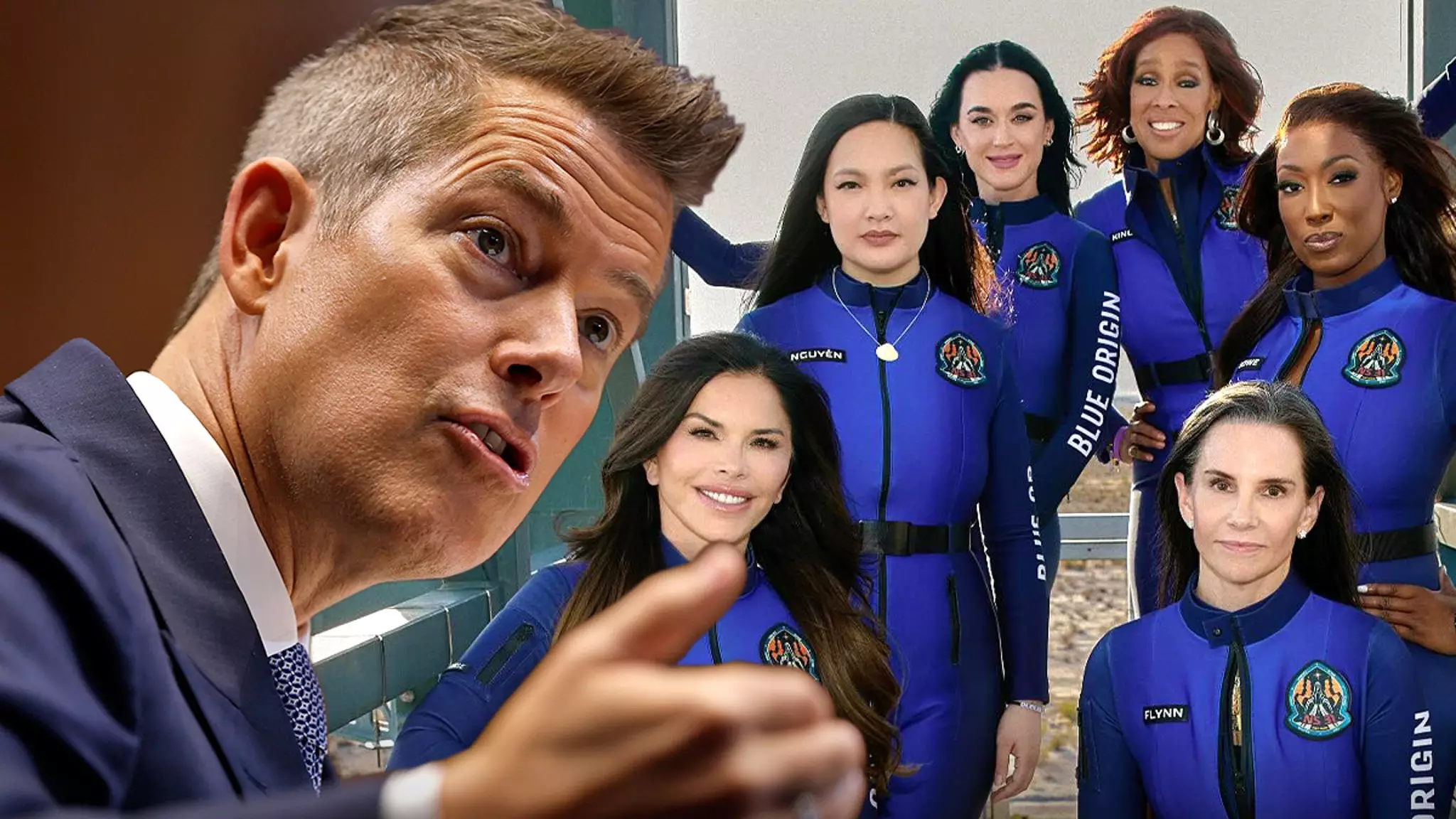In recent times, discussions surrounding space travel have intensified, especially with high-profile figures like Katy Perry and other celebrated women embarking on short journeys into the cosmos. However, the U.S. Transportation Secretary’s criticism of these journeys prompts essential questions about what constitutes an astronaut. Sean Duffy’s comments highlight a stringent interpretation of the Federal Aviation Administration (FAA) guidelines, particularly concerning who can rightfully bear the title of astronaut. According to Duffy, simply reaching the edge of space—marked at 62 miles above Earth—does not inherently qualify the participants as astronauts, particularly when they did not engage in activities necessary for safety or advancement in human spaceflight.
This definition raises fundamental issues about the criteria for space travel. If crossing into “space” requires a demonstration of essential flight activities, then the experiences of these women—celebrated public figures—could be seen as lacking the rigor and responsibility that traditional astronauts are expected to embody. The FAA has updated its guidelines to categorize astronaut qualifications more strictly, underscoring that not all who venture into the great beyond are entitled to the title. This creates a fascinating disconnect between societal perceptions of bravery and the technicalities enforced by regulatory bodies.
The Backlash: Poised for Critique
The decision to label such flights as astronaut missions has sparked significant criticism, with detractors questioning the motivations behind these high-profile jaunts. Public figures have slammed the flights, positioning them as extravagant displays of wealth and privilege at a time when significant issues confront ordinary Americans—“we can’t even afford eggs,” remarked Olivia Munn, echoing the sentiment of contributors who feel that such space tourism ignores pressing social problems.
Critics are not limited to mere commentary; they argue that these excursions risk trivializing genuine space exploration and undermine the groundbreaking contributions being made by astronauts who train rigorously for years to undertake missions that contribute to public safety and scientific advancement. This dichotomy highlights a broader societal debate: can the pursuit of personal pleasure in space travel coexist with the responsible exploration of our universe?
Furthermore, the environmental ramifications of space tourism cannot be ignored. As more commercial ventures take flight, the question arises—what is the ecological cost of launching the privileged few into the stratosphere? Such criticism reflects a growing awareness of the environmental damage caused by rocket launches, casting a shadow over the glamor of space tourism and prompting the need for a more conscientious approach to outer space exploration.
Personal Experience vs. Responsibility: A Delicate Balance
While the participants in these celebrated flights, including well-known names and advocates, have passionately defended their journeys, claiming they do not detract from urgent matters on Earth, the impact of their actions remains hotly contested. Gayle King’s post-flight assertion positions her experience as a testament to adventure rather than excess, urging the public to recognize the technological advancements made possible by companies like Blue Origin.
Yet, one must ask: does personal fulfillment within the bounds of privilege outweigh the collective responsibility to address social disparities? For instance, Jessica Alba’s remarks, suggesting that societal ire should be redirected towards political leaders rather than the individuals who opt for such experiences, do little to mitigate the conversation surrounding affluence and inequality in America.
These multidimensional discussions provide a rich tapestry of perspectives on space travel. They can illuminate wider issues of privilege, responsibility, and the true meaning of exploration. Are the accomplishments of modern astronauts and commercial space explorers elevating humanity, or simply glorifying wealth?
A New Frontier: The Dual Nature of Human Exploration
As humanity stands on the brink of a new age in space exploration, the lines between commercial and scientific journeying continue to blur, challenging our foundational ideas about exploration and achievement. Space, often romanticized as the final frontier, now appears as a battleground for societal values, aspiration, and the very meaning of heroism in our age.
This moment in history is crucial for shaping the future of space exploration. As companies rise to famous fame and public attention, it is imperative that we engage critically with the reality of these journeys. By examining the ramifications of such trips—not just for the individual travelers but for society as a whole—we can foster a more inclusive, responsible dialogue about our collective aspirations in reaching for the stars.
Ultimately, as we bear witness to this evolving landscape of space travel, we must remain vigilant about the definitions we ascribe to those who venture beyond our planet, ensuring that we valuably distinguish between escapism and meaningful exploration.

